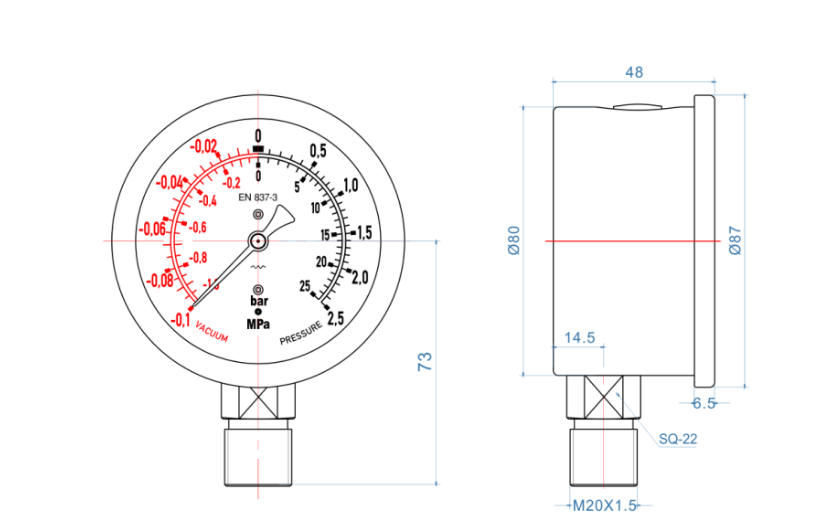
Oct . 22, 2024 10:44 Back to list
Exploring Various Applications of Differential Pressure Gauges in Industrial Settings
Understanding the Types of Differential Pressure Gauges and Their Services
Differential pressure gauges are essential instruments used in various industries to measure the difference in pressure between two points in a system. This measurement is critical to ensuring that processes run smoothly and safely, particularly in fields such as HVAC, chemical processing, and water treatment. Understanding the different types of differential pressure gauges and their specific services can help professionals select the right tool for their needs.
Types of Differential Pressure Gauges
1. Mechanical Differential Pressure Gauges These are the most common type of differential pressure gauges. They utilize mechanical components, such as Bourdon tubes or diaphragms, to measure pressure differences. When pressure is applied, the mechanical element deforms, and this deformation is translated into a readable measurement on a dial. They are known for their simplicity, reliability, and relatively low cost, making them suitable for a wide range of applications.
2. Electronic Differential Pressure Gauges Unlike mechanical gauges, electronic differential pressure gauges use transducers and microprocessors to measure pressure differences. These gauges provide digital readouts, which can be easier to read and more precise. They often come equipped with features such as data logging, alarms, and the ability to interface with other electronic systems. This makes them ideal for more complex industrial applications where accuracy and real-time monitoring are crucial.
3. Capacitive Differential Pressure Gauges Capacitive gauges operate based on changes in capacitance due to pressure variations. These gauges are often used in cleanrooms and labs, where precise measurements are necessary. They can be very sensitive and are typically used for low-pressure differentials. Their high accuracy and ability to work in challenging environments make them favorable in applications that require strict control and monitoring.
4. Piezoresistive Differential Pressure Sensors These sensors measure differential pressure by using materials whose electrical resistance changes with applied pressure. This type of gauge is widely used in the process and manufacturing industries due to its high accuracy and reliability. Piezoresistive sensors are also capable of detecting very small changes in pressure, making them suitable for applications such as fluid level measurements and filter monitoring.
types of differential pressure gauges service

Services Provided by Differential Pressure Gauges
Differential pressure gauges serve numerous vital functions in various industries. One of the primary services they provide is monitoring the performance of filters and strainers. In many industrial processes, filters are essential for maintaining fluid cleanliness and quality. A significant increase in the differential pressure across a filter indicates that it may be clogged, prompting maintenance or replacement to ensure efficient operation.
Additionally, these gauges are crucial in HVAC systems, where they measure the airflow and pressure drop across components like coils and ducts. By monitoring these parameters, HVAC technicians can optimize system performance and ensure energy efficiency. A differential pressure gauge can alert maintenance staff to any issues, preventing system failures and extending equipment life.
In the chemical processing industry, maintaining proper pressure levels is critical for safety and operational efficiency. Differential pressure gauges help monitor reactions by ensuring that pressure differences are within acceptable limits. This monitoring is vital in processes involving volatile substances where deviations can lead to dangerous situations.
In the water treatment sector, these gauges are used to monitor pressure changes across various treatment stages, ensuring that systems operate within safe parameters. Accurate differential pressure readings can signal when maintenance is needed, safeguarding infrastructure and environmental health.
Conclusion
Differential pressure gauges play a crucial role in numerous industries by providing vital pressure measurements that ensure operational efficiency, safety, and equipment longevity. Understanding the various types of differential pressure gauges and their specific applications can help professionals make informed decisions in selecting the right gauge for their unique needs. Whether mechanical or electronic, each type offers distinct advantages that cater to the demands of different environments, contributing to the overall success of industrial processes.
-
High-Quality Pressure Gauge on Fire Extinguisher - Reliable Water Fire Extinguisher Pressure Gauge Suppliers & Exporters
NewsJul.08,2025
-
High-Quality Water Pressure Differential and Gauge Kit Reliable Manufacturers & Competitive Quotes
NewsJul.08,2025
-
High-Precision Digital Diaphragm Pressure Gauge – Reliable Manufacturer & Competitive Quotes
NewsJul.07,2025
-
Wholesale Diaphragm Pressure Gauge Supplier - Premium Quality & Competitive Price
NewsJul.07,2025
-
Digital Diaphragm Pressure Gauge Reliable & Precise Measurement Top Manufacturers Quotes
NewsJul.06,2025
-
High Accuracy Piston Type Differential Pressure Gauge - Reliable Manufacturers & Competitive Quotes
NewsJul.06,2025
